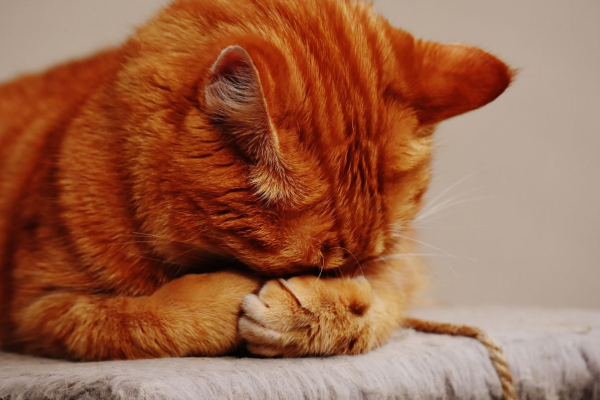You’ve heard the phrase, “curiosity killed the cat.”
That can be true when it comes to accidental poisoning caused when curious kitties get into stuff you typically have around the house, such as laundry detergent, soda pop, or cut flowers.
While some household items may only cause mild stomach upset, others can be fatal. Your best line of defense is to cat-proof your house, removing poisons dangerous to cats (or at least, keeping them completely out of your cat’s reach).
In this article, we’ll introduce you to 15 common items that are toxic for cats. We’ll explain what to do if your cat ingests something poisonous, and give you six tips for keeping toxic substances away from your kitty.
15 Common Feline Poisons
1. Poisonous plants
Cats love munching on greenery and bouquets of flowers. But some common plants, such as tulips, daffodils, lilies, philodendrons, Dieffenbachia, foxglove, and Japanese yew, are very dangerous for cats.
Two of our readers shared their sad personal experiences with lilies, which are particularly toxic.
One wrote:
“My husband gave me some beautiful orange lilies for my birthday and, as much as I tried to keep our three-week-old kitten away from them, she managed to get to them. She was diagnosed with acute kidney failure and we had to put her to sleep. We are devastated, feeling guilty because we should’ve researched more about what is harmful for cats… Those flowers need to have a warning saying that they can kill your cat.”
Only one bite of the petals or leaves can kill a cat! Even licking the pollen or lapping up water from the vase can result in severe, potentially irreversible acute kidney failure.
Another reader shared, “An innocent-looking day lily shut down my cat’s kidneys with only one bite.”
This reader advised, “Check your home, yard, neighbor’s yard – everywhere you can think of for any kind of lily.”
The following varieties of lilies are poisonous to cats:
- Tiger lilies
- Day lilies
- Asiatic hybrid lilies
- Japanese show lilies
- Easter lilies
- Rubrum lilies
- Stargazer lilies
- Red lilies
- Western lilies
- Wood lilies
2. Laundry detergent, drain cleaner, toilet bowl cleaner, and other household cleaners
One of our readers lost their 5-month-old kitten, who consumed laundry detergent and died from epilepsy.
When ingested by a cat, some household cleaning products can cause profuse drooling, chemical burns, vomiting, diarrhea, seizures, difficulty breathing, and even death.
Keep your cat out of the room while you’re scrubbing toilets or doing laundry. And be sure to keep all household cleaners and pesticides out of reach of cats.
3. Clothes Dryers
One of our readers warned that clothes dryers, while not poisonous, can be dangerous to cats. This reader lost their sweet 5-month-old kitten to the dryer.
4. Human antidepressants
Human antidepressants are like catnip to cats. They love the smell of common antidepressants such as Effexor, Prozac, Cymbalta, and Zoloft and can’t resist eating the pill.
However, instead of improving their mood and energy level, human antidepressants can cause lethargy, tremors, seizures, vomiting, diarrhea, and hyperthermia in cats.
5. Alcohol
Even small amounts of this depressant can cause vomiting, diarrhea, drowsiness, and loss of coordination in cats. In severe cases, alcohol poisoning can lead to respiratory depression, coma, and death.
6. Caffeinated drinks
The caffeine in drinks such as coffee, tea, and soda can cause vomiting, diarrhea, increased heart rate, and restlessness in cats. In severe cases, caffeine poisoning can lead to seizures, coma, and death.
7. Flea and tick topical medications for dogs
Never apply an insecticide intended for dogs (even small dogs) to your cat. These medications often contain high concentrations of a chemical derived from the Chrysanthemum flower – a chemical that is highly toxic to cats. Don’t allow your cat to lick the medication off your dog, either.
8. Over-the-counter aspirin, baby aspirin, naproxen, and ibuprofen
If your cat is experiencing joint pain, giving him even half a pill can be fatal, resulting in stomach ulcers and kidney failure. Consult your veterinarian before giving your cat any over-the-counter medications for pain.
9. Onions, Garlic, Chives
The gastrointestinal irritation humans feel when indulging in copious amounts of onions, garlic, or chives is compounded in cats. The sulfur compounds in onions and garlic can damage red blood cells in cats, leading to anemia.
Symptoms of onion or garlic poisoning in cats include vomiting, diarrhea, lethargy, pale gums, and decreased activity. In severe cases, onion or garlic poisoning can be fatal.
10. Chocolate
Chocolate contains a substance called theobromine, which is toxic to cats. The amount of theobromine that is toxic varies, depending on the size of the cat and the type of chocolate.
In general, dark chocolate is more toxic than milk chocolate – even a small amount of dark chocolate can be harmful to a cat. Small cats are more sensitive to chocolate than large cats.
Symptoms of chocolate poisoning include vomiting, diarrhea, increased thirst, increased urination, muscle tremors, seizures, and even death.
11. Raisins and Grapes
Grapes and raisins are another popular human food toxic to cats. Although the toxic substance within grapes and raisins is unknown, even a small amount of grapes or raisins can cause kidney failure.
Symptoms of grape or raisin poisoning include vomiting, diarrhea, lethargy, loss of appetite, and increased thirst. In severe cases, grape or raisin poisoning can be fatal.
12. Macadamia nuts
Macadamia nuts are a delicious treat for humans, but they can be toxic to cats.
Symptoms of macadamia nut poisoning include vomiting, diarrhea, weakness, tremors, and hyperthermia. In severe cases, macadamia nut poisoning can be fatal.
13. Raw yeast dough
Raw yeast dough contains a substance called ethanol, which is a type of alcohol. Ethanol can be toxic to cats, and even a small amount can cause vomiting, diarrhea, and abdominal pain. In severe cases, raw yeast dough poisoning can lead to alcohol poisoning and death.
14. Raw or undercooked meat
Raw or undercooked meat can contain harmful bacteria, such as salmonella and E. coli, that can make cats sick.
Symptoms of food poisoning in cats include vomiting, diarrhea, fever, and lethargy. In severe cases, food poisoning can lead to dehydration, shock, and death.
15. Xylitol
Xylitol is a sugar substitute that is often used in sugar-free gum, candy, and baked goods. It is also found in some toothpastes and mouthwashes.
Xylitol is toxic to cats because it causes a rapid release of insulin, which can lead to liver failure.
Symptoms of xylitol poisoning in cats include vomiting, diarrhea, lethargy, loss of coordination, and seizures. In severe cases, xylitol poisoning can be fatal.
What to do if you think your cat was poisoned
If you think your cat has ingested or been exposed to a toxic substance, call your veterinarian immediately. Do not induce vomiting unless your veterinarian tells you to do so. The sooner your cat receives treatment, the better the chances of a full recovery.
You can also all the ASPCA Animal Poison Control Center Hotline: (888) 426-4435 (fee-based). For info, visit https://www.aspca.org/pet-care/animal-poison-control
Or call the Pet Poison Helpline (fee-based). For info, visit https://www.petpoisonhelpline.com/
6 ways to prevent your cat from ingesting toxic substances
There are six things you can do to keep your cat safe:
- Keep all toxic items out of reach of your cat. This means putting them up high where your cat cannot reach them, or locking them in a cabinet or drawer that your cat cannot open.
- Label all toxic items with a warning label. This will help to remind you and other members of your household to keep them out of reach of your cat.
- Teach your children not to give your cat any food or drinks that are not specifically designed for cats.
- Keep your cat’s food and water bowls away from any potential sources of contamination, such as cleaning supplies or pesticides.
- If you are using any type of pesticide, make sure to read the label carefully and follow the directions exactly.
- If you are unsure whether or not something is toxic to your cat, it is always best to err on the side of caution and keep it out of reach.















